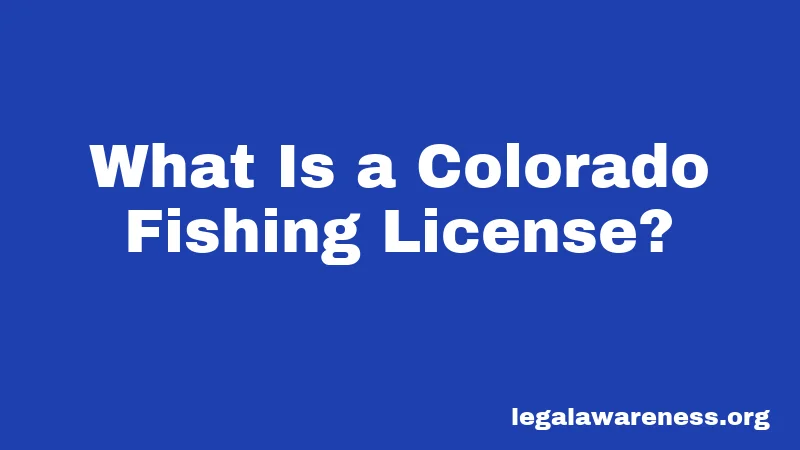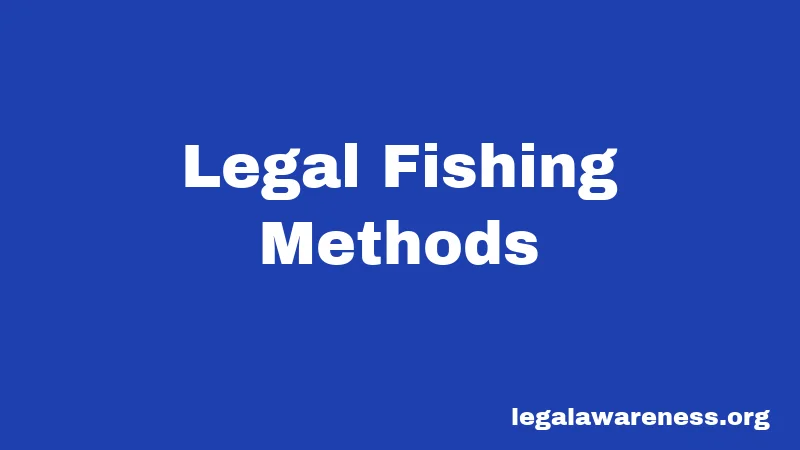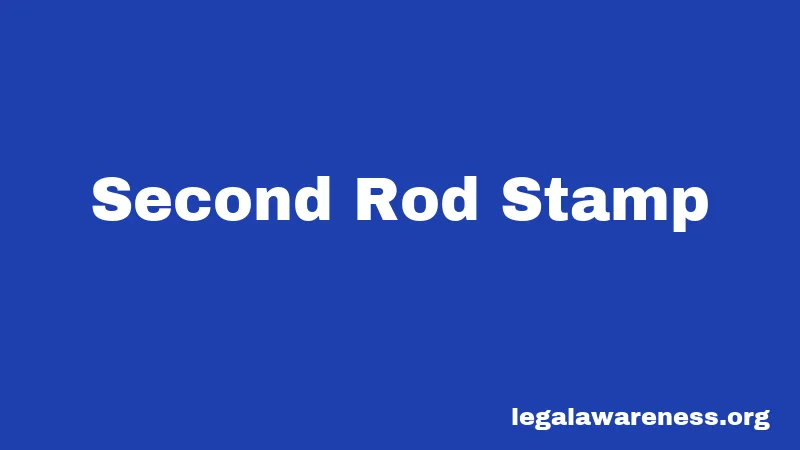Colorado Fishing Laws in 2026: Everything You’re Missing
Most people have no idea how strict Colorado’s fishing rules actually are. Seriously. You could think you’re following the law and still end up with a hefty fine and points against your license. Let’s break down exactly what you need to know before you cast that line.
Colorado offers some of the best fishing in the country. You can fish anywhere in 6,000 miles of streams and more than 1,300 lakes and reservoirs. But that freedom comes with responsibility. Get it wrong, and you could face more than just a ruined fishing trip.
What Is a Colorado Fishing License?

Here’s the simple part. A fishing license is your permission slip to fish in Colorado. Stay with me here—this matters because you can’t legally fish without one (with a few exceptions we’ll cover).
Fishing licenses are valid from March 1, 2025, through March 31, 2026 (13 months). Think of it like renewing your car registration. You need it current and on you when you’re fishing. Not “at home in a file somewhere.” Actually with you.
License Types and Pricing
Your wallet will appreciate knowing the options. An adult annual license for a Colorado resident is $42.91 plus tax, with discounts for seniors, youth and people who are low income. A one-day license is $16.72 for Colorado residents.
Don’t have the cash right now? The one-day option is perfect for a weekend trip. Planning to fish more than twice a year? The annual pass makes way more sense financially.
Here’s the thing: Youth aged 15 and under fish for free. Yep, that’s right. Kids get to fish without paying anything. This is actually one of the best deals in Colorado.
Not sure if you fit in a discount category? Anglers can purchase a license online at cpwshop.com, by phone at 1-800-244-5613, in-person at a CPW office or through a sales agent. The folks at these places can answer your questions about which license works for you.
Legal Fishing Methods

Okay, pause. Read this carefully. Not all ways of catching fish are legal in Colorado.
You can fish with a rod and reel. You can use fly fishing gear. You can use hand lines. But you can’t use a net. You can’t use explosives (yes, people ask). You can’t use poisons. Pretty straightforward, right?
One more method worth mentioning: ice fishing. When the water freezes, you can fish through holes in the ice. But here’s the catch—your holes can’t be bigger than 10 inches across. And any fire on the ice has to be contained in a container. Sounds like a detail, but these are the kind of rules that can get you into trouble.
There are also some waters with special restrictions. Some streams are designated as “fly and lure only.” That means no bait fishing allowed. Always check the specific regulations for the water you’re planning to visit.
Bag Limits and Size Restrictions
This is where most people slip up. Bag limits are the maximum number of fish you can keep per day. It’s not complicated, but it matters.
For most trout species in Colorado, your statewide bag limit is four fish. That’s it. You can’t keep five. Not if you catch five. The fourth one goes back in the water. Sound harsh? The state does this to keep fish populations healthy.
Some species have different rules. Walleye and saugeye have different limits depending on where you fish. Bass have minimum size requirements—usually 15 inches. Some waters are completely catch-and-release. That means you catch them and put them back.
Here’s what trips people up: the moment a fish goes on your stringer or in a cooler, it counts toward your limit. You can’t put it back later and say it didn’t count. Once it’s in your possession, the clock is ticking on your bag limit.
Different waters have different rules too. A stream 20 miles away might have completely different limits than where you’re standing. Wondering if this applies to you? Check the specific water regulations before you go. Colorado Parks and Wildlife lists all special regulations online.
Second Rod Stamp

You want to fish with two lines at once? That’s allowed in Colorado, but it costs extra. A second rod stamp lets you use a second rod. You need to purchase it, sign it, and attach it to your license.
Here’s the thing: if you’re under 16 and don’t have a fishing license (because kids fish free), you still need a second rod stamp to use two lines. The stamp is how Colorado tracks who’s fishing with multiple lines.
Who Doesn’t Need a License
Kids under 16 get the best deal of all. They can fish for free and keep a full bag limit. No license required. This is one of the most family-friendly fishing policies in the country.
There’s one other exception. Free fishing dates happen the first full weekend of the month of June. On these dates, anyone can fish without a license. It’s Colorado’s way of introducing people to the sport.
If you fish on a free fishing date, you still have to follow all other rules. Bag limits, size restrictions, and legal methods all still apply. The only thing free is the license requirement.
Private Property Rules
Here’s where things get serious. You can’t trespass to fish. Period.
It’s illegal to go onto private land to fish without permission, even if the stream runs through it. Private land is not required to be posted or fenced. That means you need written permission from the owner before you step foot there.
What happens if you ignore this? You could face a fine of $200 or more. Plus license suspension points. Plus a potential trespass charge on top of that.
Confused about what’s private and what’s public? Ask before you fish. It only takes a minute, and it could save you hundreds of dollars and a lot of legal headache.
Catch and Release vs. Harvest
Some waters require you to catch and release. That means you fish the whole day, keep trying for bigger fish, but you can’t keep any of them. They all go back in the water.
This sounds frustrating, but there’s a reason. These waters are managed specifically to build up fish populations and protect certain species. By catch-and-release fishing, you’re helping conservation efforts.
Other waters let you harvest (keep) fish up to your bag limit. Some have minimum size requirements. It’s like this: catch-and-release protects the fishery. Harvest limits protect it a different way. Both rules exist because Colorado cares about keeping fish populations thriving.
Ice Fishing Specific Rules
Winter fishing requires paying attention to details. Your ice fishing hole can’t exceed 10 inches in diameter (or 10 inches on any side if it’s square). Sounds oddly specific? This rule prevents people from creating massive holes that damage the ice.
Any fires on the ice must be contained. An enclosed container is required. This prevents the ice from melting underneath, which could be dangerous.
All other fishing rules apply when you’re ice fishing too. Size limits, bag limits, and legal methods are exactly the same. Cold weather doesn’t change the regulations.
Penalties and Consequences
Here’s where things get real. Breaking fishing laws comes with serious consequences. Not just fines, either.
Fishing without a license is a misdemeanor (more serious than a regular ticket). A person who violates this is guilty of a misdemeanor and, upon conviction thereof, shall be punished by a fine of one hundred dollars and an assessment of ten license suspension points.
Hold on, that’s important. Read that carefully. It’s $100 minimum. But that’s just the start.
If you’re caught with fish in your possession while fishing without a license, things escalate quickly. You can be charged for each fish you’re holding. The fine becomes twice the cost of the most expensive license for each species. For non-residents, this can easily add up to hundreds of dollars for just a couple of fish.
Think about that for a second. One afternoon of illegal fishing could cost you $500+. That’s more than five times the cost of an annual license.
License Suspension Points
Colorado uses a points system for hunting and fishing licenses. Every violation adds points to your record. Earn 20 points within a five-year period, and your fishing license gets suspended.
Fishing without a license gives you 10 points. That’s half the way to a suspension right there. If you commit another violation within five years, you could lose your license completely.
This isn’t just about Colorado either. Any person whose license privileges are suspended in a member state would also be suspended in Colorado. The Interstate Wildlife Violator Compact means other states recognize Colorado suspensions. You could lose fishing privileges in 44 states because of one Colorado violation.
What Happens With Suspensions
First suspension? Your license gets suspended for up to five years. You can’t buy a fishing license during that time. You can’t fish legally anywhere in Colorado.
Second suspension? Same thing—up to five years.
Third suspension? Now it’s permanent. Colorado law requires a lifetime suspension after three violations. Think about that. One lifetime mistake because you broke the rules three times.
You can request a hearing with the Parks and Wildlife Commission to appeal a suspension, but the burden is on you to prove why you shouldn’t be suspended. It’s not easy to get out of.
Using Someone Else’s License
This seems like it would be obvious, but people try it. Using, altering, or lending someone else’s fishing license is illegal. A person who violates this is guilty of a misdemeanor and, upon conviction thereof, shall be punished by a fine of two hundred dollars and an assessment of fifteen license suspension points.
Just having the wrong name on a license makes it void and useless. Both people—the person using it and the person who lent it—can face charges.
Not sure if something’s legal? It’s not. Just don’t do it.
Special Regulations by Water
Colorado has over 1,300 fishing waters. Some have special rules. Some are completely different from statewide regulations.
Gold Medal waters exist in Colorado. These are managed specifically for quality fishing. They often have stricter bag limits and size requirements. Why? Because Colorado is protecting a premium fishing experience.
Some waters are designated as “Wild Trout” waters. These have no stocking—the fish naturally reproduce there. They typically have more restrictive regulations.
The bottom line: Check the specific water regulations before you fish. Colorado Parks and Wildlife publishes these rules. It takes five minutes to check. It takes way longer to deal with a violation.
Free Fishing Days
Remember we mentioned free fishing dates? The first full weekend of June is when everyone can fish without a license. No license needed. No fee. Just pure fishing access.
This is Colorado’s invitation to newcomers. Want to try fishing before you buy a license? This is your chance. But again, all other rules still apply. You can’t ignore bag limits just because you don’t have a license.
Reporting Violations
See someone breaking the rules? Colorado Parks and Wildlife wants to know. Illegal fishing hurts the entire fishery and everyone who fishes legally.
You can report violations to CPW. They take these reports seriously because illegal fishing literally destroys the quality of fishing for everyone else. Poaching affects fish populations. It affects your fishing experience next year.
How to Get Started Fishing Legally
First, decide what type of license you need. If you’re going once? One-day pass. Twice a year or more? Annual pass makes sense.
Buy your license online, by phone, or in person. Keep it with you. Not at home. On your body.
Check the specific water regulations for where you’re fishing. Look up bag limits, size restrictions, and any special rules.
Follow the rules. All of them. This isn’t a suggestion situation.
It’s that simple. Honestly, most of this is just common sense applied to fishing.
Colorado’s Fish Species
Colorado has over 35 species to fish for in some of the most scenic bodies of water. You can catch trout, bass, walleye, pike, crappie, sunfish, and more.
Different species have different regulations. A brook trout might have a different bag limit than a cutthroat trout in the same water. A largemouth bass might have a minimum size requirement that a smallmouth doesn’t.
This is why checking regulations specific to what you’re fishing for matters. Not all fish are treated the same in Colorado.
Supporting Colorado’s Fisheries
Your license fee isn’t just a tax. It funds Colorado’s entire fishing program.
By purchasing a fishing license, anglers play a crucial role in funding Colorado’s fishery management, supporting hatcheries and fish stocking operations. Your $43 annual license directly pays for fish to be raised and released into Colorado waters.
This is why Colorado takes violations seriously. You’re essentially stealing from a program that benefits everyone who fishes. It affects next year’s fish populations, your friends’ fishing trips, and the overall quality of Colorado’s fishing.
Frequently Asked Questions
Do kids really fish free in Colorado?
Yes, completely free. Kids under 16 don’t need a license and can keep the full daily bag limit. This is one of the best fishing deals in the country.
What’s the biggest fine for fishing without a license?
If you’re caught with multiple fish and no license, fines can exceed $500. The fine multiplies with each species you’ve caught.
Can I fish with live bait everywhere in Colorado?
No. Some waters are fly and lure only. Always check the specific water regulations before you go.
What happens if I get caught fishing illegally multiple times?
Three violations can result in a lifetime suspension. You lose your fishing privileges permanently.
Are there free days to fish in Colorado?
Yes, the first full weekend of June. No license required. All other rules still apply.
Final Thoughts
Colorado’s fishing laws exist for one reason: to protect and preserve some of the best fishing in America. It’s not bureaucratic overreach. It’s conservation.
Most of these rules are straightforward. Get a license. Keep it with you. Know the limits for the water you’re fishing. Keep the fish under the size limits. Don’t trespass. That’s it.
The penalties are real though. One mistake can cost you hundreds of dollars and your fishing license for up to five years. Is one illegal fish worth that? Almost never.
Now you know the basics. Stay informed, follow the rules, and when in doubt, call Colorado Parks and Wildlife or look it up online. They’re there to help, and they’d rather answer a question than write a ticket.
References
Colorado Parks and Wildlife – Fishing Information
2025 Colorado Fishing Brochure and Regulations
Colorado Revised Statutes Title 33 – Parks and Wildlife
Colorado Parks and Wildlife – Fishing License Purchase
Suspending Hunting and Fishing Privileges in Colorado

I really hope that the anglers that are trying to change the agenda tat they have a right to go on to private property to fish is deboshed completely, since there are 1000’s of miles of public and state and federal owned waters they can fish in. there is no reason for them to rape a property owner of their privacy by legally trespassing on their property because they hold a fishing license